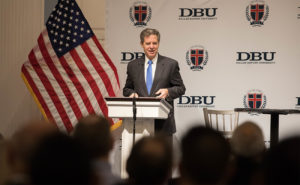Nigeria listed among worst religious freedom violators
WASHINGTON (RNS)—The U.S. State Department has added Nigeria to its list of countries deemed to have the most egregious violations of religious freedom.

Sam Brownback, the department’s ambassador-at-large for international religious freedom, said in a Dec. 8 telephone briefing the African country was designated as a “country of particular concern” because of an increasing number of organized terrorist groups and “a lot of religious-tinged violence.”
“You’ve got expanded terrorist activities, you’ve got a lot of it associated around religious affiliations, and the government’s response has been minimal to not happening at all,” Brownback said of Nigeria, according to a State Department transcript. “The terrorism continues to happen and grow, in some places unabated.”
He spoke on the day after Secretary of State Mike Pompeo announced the latest designations of countries cited for violating religious liberties, including the addition of nine other nations now designated as countries of particular concern: Burma, China, Eritrea, Iran, North Korea, Pakistan, Saudi Arabia, Tajikistan, and Turkmenistan.
The U.S. Commission on International Religious Freedom hailed the State Department’s decisions.
“We particularly welcome Nigeria’s designation for the first time as a CPC for tolerating egregious violations of religious freedom, which USCIRF had been recommending since 2009,” said commission Chair Gayle Manchin. “Nigeria is the first secular democracy that has been named a CPC, which demonstrates that we must be vigilant that all forms of governments respect religious freedom.”
State Department declines to add India to list
The commission had also suggested the State Department give India, Russia, Syria and Vietnam the CPC designation but it did not. The commission had said in its April report that India should be added because of its passage a year ago of the Citizenship Amendment Act, a law that gives Hindus and religious minorities from neighboring countries a fast track to citizenship but excludes Muslims.
Asked why India did not get named to that list, Brownback said “we watch the situation in India very closely” and Pompeo has visited there a number of times.
“These issues have been raised in private discussions at the government—high government level, and they will continue to get raised,” he said.
The State Department listed again Comoros, Cuba, Nicaragua and Russia on its second-tier “special watch list.”
It removed Sudan and Uzbekistan from that watch list. In July, Sudan repealed its apostasy law that previously called for the death penalty for persons convicted of renouncing Islam.
“Their courageous reforms of their laws and practices stand as models for other nations to follow,” Pompeo said.
The commission had urged that those two nations stay on the list earlier this year. But Tony Perkins, vice chair of the watchdog group, stated “it is undeniable the historic progress that has been made in these two countries. We hope that their progress encourages positive change in other places around the world.”
The State Department also listed numerous militant groups as “entities of particular concern”—al-Shabab, al-Qaida, Boko Haram, Hayat Tahrir al-Sham, the Houthis, the Islamic State group or ISIS, ISIS-Greater Sahara, ISIS-West Africa, Jamaat Nasr al-Islam wal Muslimin and the Taliban.
But it removed that designation from al-Qaida in the Arabian Peninsula and ISIS-Khorasan, due to loss of territory those terrorist organizations had controlled.
Brownback reiterated on the call the work of the Trump administration to encourage peaceful cooperation among leaders of the Abrahamic faiths, an effort that he said continued with an online peace summit he attended with prominent Christian, Muslim and Jewish theologians the previous day, which emphasized opposing religious violence.
“I still want to get the picture of top theologians of Judaism, Islam, and Christianity standing in front of Abraham’s tomb, pointing to—this is the starting point of our faith, this person,” he said. “I think the world needs to see that, because we’re seeing so much division in the world, particularly between Christians and Muslims, but also Jews as well.”